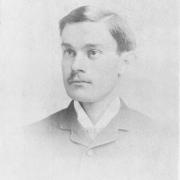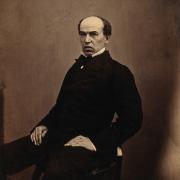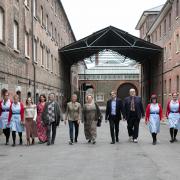Have you ever seen a film at the cinema and thought, that place looks familiar? If you're watching Avatar, then you probably need a bit of rest. But if you're not, then there's an increasingly good chance you have seen it before in Kent
The attraction of Kent is becoming more and more apparent to a new generation of filmmakers.
While the county can’t compete with the gritty urban realism of the nearby capital, Kent’s abundant charms offer filmmakers a broad variety of settings.Thinking about filming in Victorian England, why not try the Dickensian beauty of Rochester? Or if it’s a touch of Tudor you want, what about Hever Castle, the real-life home of Mary and Anne Boleyn? Then there are the towns of Margate, Broadstairs and Folkstone, which perfectly illustrate the English seaside aesthetic.
The county’s physical heritage is one of the most impressive in the country. But it’s not just Kent’s castles and stately homes that are grabbing the attention of directors. Is there any more patent symbol of England than Dover’s white cliffs? Can the windswept isolationism of the Romney Marsh be matched anywhere else? Does the county’s gently rolling landscape offer anything but the perfect capturing of the English rural idyll?
In the last few years, a growing number of films have chosen Kent as a location for part of their production. These include The Golden Compass, Sherlock Holmes and The Other Boleyn Girl. And television is taking notice, too.
The list of shows that have been filmed here over the last five years is extensive, from Merlin to Little Dorrit and Emma, the list goes on and on. There are now 1,400 filming days taking place in the county each year, a figure that is estimated to rise further in the future.Although much of this growth has originated from outside organisations choosing the county as a setting, Kent has also seen the recent growth of its own indigenous film industry.
While cost remains one of the main reasons for filming here, local boy Leon Chambers, a director who has won several awards for his films, most notably for his last production, Stolen Youth, thinks that there are other reasons too.
“Cost is always an issue,” he admits. “It’s much cheaper down here than in London. All filmmakers need to consider their costs and this is especially true for smaller-scale filmmakers like me who often work on very tight budgets. “But filmmaking is about more than just money. I live in Kent and I thought that making a film in this location would give it more truth and I think that’s true for other local filmmakers. “Writers and directors often produce work that is rooted in their surroundings, and I think transplanting the story to another location can sometimes undermine the authenticity of a production.”
One aspect of Kent’s growing attraction, echoed by many people involved in filmmaking in the county, is the role played by the Kent Film Office. Kent County Council established this to both assist people choosing to film in the county and also to promote Kent as a film-friendly place. It also provides funding opportunities to filmmakers via the County Council’s Development Fund.
“The Film Office is a great innovation for filmmakers,” says local producer Ben Pullen, whose company Sentinel Entertainment is based near Faversham. “It’s quite rare for a local authority to understand the needs of filmmakers so comprehensively and also to do something about it. “The Film Office really provides a complete service for filmmakers. They have advice on locations and also a list of people locally who are involved in the industry, such as creatives and crew.
He adds: “You can get advice about production and also get help to work around the many problems that filming in a particular location can sometimes throw up. There are other regional organisations, such as Screen South, who help people such as me, but I think that to have a specific organisation that acts at a county level is great benefit to Kent.”But what does the increase in filming actually bring? It’s very nice to see the county as a backdrop on film or television, but are there any tangible benefits? According to Leon Chambers, the county’s desirability is something we should all welcome.
“You have to think that when a production comes to a location that means a big increase for local services, which can mean a boost for hotels, pubs, restaurants, etc,” he says.
“There is also the tourism side of things. In many of the films that are shot here, Kent has been chosen because of its beauty, whether that's architectural or natural. People see this, learn that it’s shot in Kent and so think about visiting that location. “When you consider the audience reach that some of these films possess, then you can appreciate what an impact a positive perception of the county could have.”
Both KCC and the Kent Film Office are also aware that in the future it will be the creative industries, which include film and television, that will provide an increasing share of the country’s economic growth. The county needs to ensure that it is well placed to capitalise on this expansion. This is why these organisations are working so hard to promote Kent as a location for filming and also assisting filmmakers financially. The latter is particularly important as having an indigenous film industry provides greater opportunities for local young people to gain both experience and jobs in film and television.
Award-winning director, Jan Dunn, whose company Medb Films is based in Ramsgate, thinks local filmmakers have a social obligation to help young people who want to get into the industry. “We offer advice and training for young people in Kent who want to learn more about film,” she says. “We also look beyond those formally trained in production techniques and embrace people who just have an interest in filmmaking.
“On my last film Ruby Blue we took on 10 people in trainee positions who were recommended to us via Connextions (the Government’s career advice service for 13-19 year olds). “Both myself and Elaine Wickham (producer of Ruby Blue and co-owner of Medb films) felt that we had been given help early on in our career and it would be a good idea for us to do the same for other people, especially those who have lost their way during their formal education,” says Jan.
And hot on the heels of Jan’s first two feature films, Gypo and Ruby Blue, is The Calling, set to release in selected cinemas from April and attracting a stellar British cast of mostly women, including Kent actress Brenda Blethyn. Kent has always been a popular location for filming. Throughout the last 70 years, some of cinema’s best-loved films such as Kind Hearts and Coronets, The Battle of Britain and Blithe Spirit have chosen this county as a setting for part of their filming.
Today, as the production of film and TV has grown almost exponentially, the opportunities available have also increased and Kent is well placed to capitalise on them. This means not only more local filmmakers but also that the chances of seeing on the screen somewhere you recognise but can’t quite place, are going to become all the more frequent in the future.


























